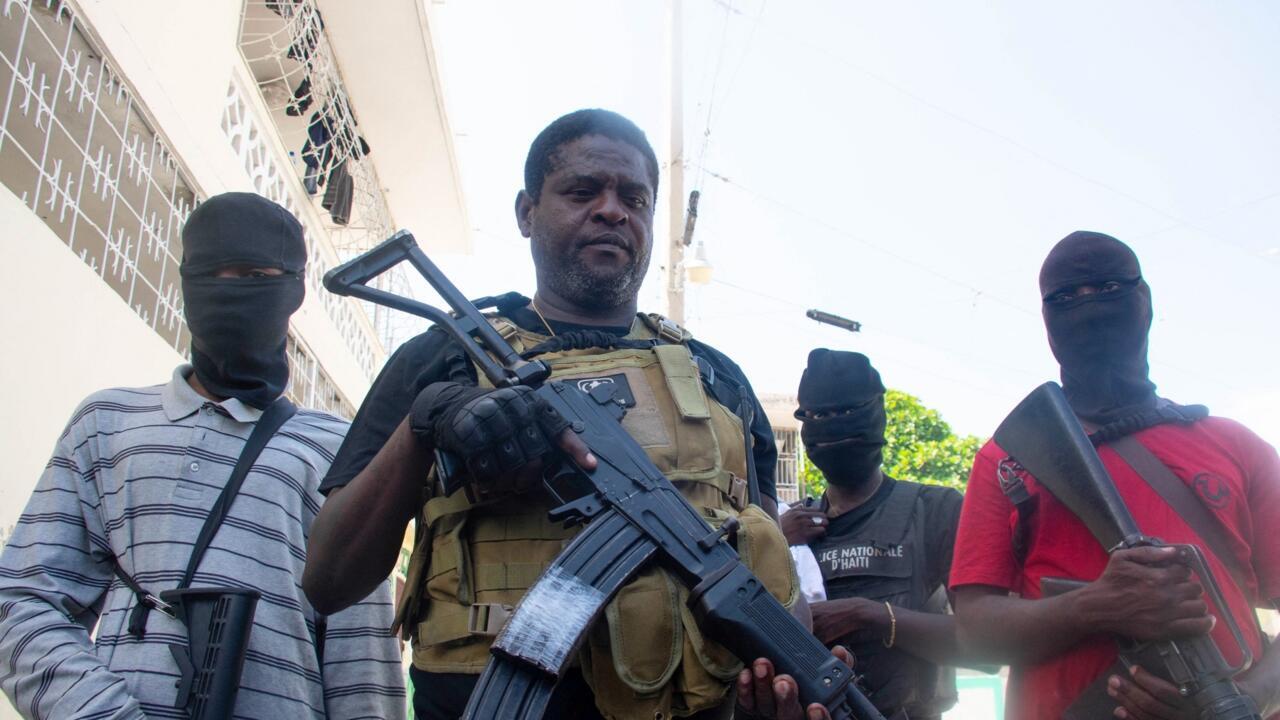Haiti: gang leader threatens civil war and genocide
In Haiti, gang leader Jimmy Cherizier threatens bloody civil war and genocide if Prime Minister Ariel Henry remains in power.
Ariel Henry who, returning from abroad, unsuccessfully attempts to return to the country.
For months, gangs have been killing, pillaging, raping, kidnapping, and controlling most of Port-au-Prince.
In the capital, residents are facing shortages.
Gang leader Jimmy Cherizier with his men in Port-au-Prince, Haiti, March 5, 2024. AFP - CLARENS SIFFROY
By: RFI Follow
Advertisement
Read more
Since last week, the gangs have been carrying out coordinated attacks in Haiti - they have freed prisoners from the country's two largest penitentiary centers, and are still trying to take control of the Port-au-Prince Toussaint-Louverture airport.
Shots continued to ring out in the area until late in the evening.
This Tuesday, March 5, during a conference, gang leader Jimmy Cherizier, aka Barbecue, threatened the country with civil war.
“If Ariel Henry does not step down, the country will suffer genocide. If Ariel Henry does not step down, if the international community continues to support Ariel Henry, it will lead us directly to a civil war which will end in genocide,
he assures.
The international community, particularly the United States, Canada, France and the Core Group will be responsible for all those who die in Haiti.
»
Also read State of emergency in Haiti: “The Haitian government has not taken the measure of the disaster”
Meanwhile, Ariel Henry is still trying to return to the country – without success.
The Haitian Prime Minister was in Nairobi to sign an agreement allowing the sending of a multinational force to Haiti.
Yesterday, according to
Dominican news channel CDN
, the Prime Minister's private plane arrived in Puerto Rico, after the Dominican Republic refused to let it land.
This Wednesday, the UN Security Council will hold an emergency meeting on the new escalation of violence in Haiti, where the situation continues to deteriorate.
“
Prices have almost doubled
”
Since the attack by gangs on two prisons this weekend and the escape of thousands of detainees, there has been gunfire in the capital Port-au-Prince.
Its residents no longer leave their homes
at the risk of receiving a stray bullet.
Pharmacies are looted, activities are mostly paralyzed.
Some traders are risking opening up shop.
But for how much longer?
Because reserves are dwindling and are not replenished.
Concern is growing
among the population.
In the streets of Port-au-Prince, piles of cars are piling up, it is impossible for delivery trucks to cross these imposing barricades.
The main drinking water company, Culligan, warned Haitians on Monday March 4 on the social network Facebook that deliveries of water cans were suspended, but the company did not specify until when.
However, the days are numbered.
Residents are drawing on their last reserves of drinking water.
This is, for example, the case of this resident of Port-au-Prince who prefers to remain anonymous.
“
When there are no more reserves, the cars will not be able to bring back water to fill these reserves, I don’t know how many days we will be able to last, I don’t know what it will be like
,” he said. She.
It is impossible to drink tap water because it is unsanitary.
But the tension isn't just around water.
Foodstuffs are also affected, explains this resident of the Haitian capital.
One more weight in the balance of inflation.
“
It’s much more expensive than before, prices have almost doubled, like rice, water or flour.
The merchants sell what they had in reserve, they will not be able to go to the large depots, because these depots are either looted or closed
,” she continues.
Food will soon run out, worsening food insecurity.
However, some 44% of Haitians are already faced with it according to the United Nations (UN).
Newsletter
Receive all the international news directly in your inbox
I subscribe
Follow all the international news by downloading the RFI application
Share :
Continue reading on the same themes:
Haiti

